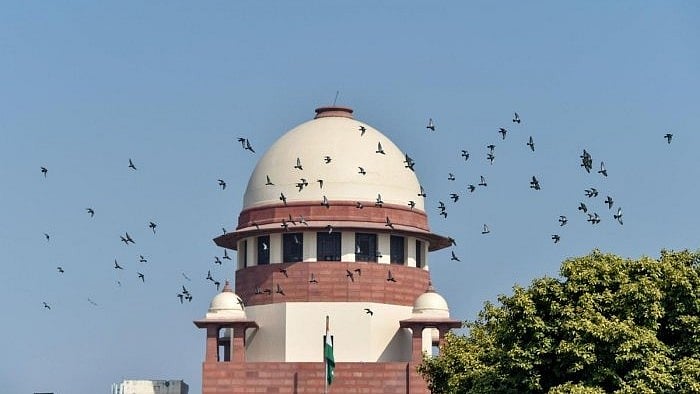
A view of the SC.
Credit: PTI Photo
New Delhi: The Supreme Court on Wednesday said that Section 6A of the Citizenship Act, 1955, may not have been meant for the benefit of all citizens, that it could have been brought in specifically to resolve violence prevailing in Assam, and the government should be given leeway if a compromise is necessary.
A five-judge constitution bench presided over by Chief Justice of India D Y Chandrachud pointed out that the court cannot look at constitutional provisions in the abstract.
The apex court noted that the Assam Accord of 1985 and the new citizenship regime which followed in its wake might have been an “adjustment” reached by the Rajiv Gandhi government.
The bench said the move could have been meant to calm the waves of violent anti-immigrant protests that rolled over the northeastern state for years and also threatened national peace.
The bench noted that a large number of persons were fleeing Bangladesh because of the sheer violence, and the provision protected those people.
The bench remarked that "the last thing we can say is that they were conferring citizenship to citizens of Pakistan, and Parliament was looking at the whole human suffering".
The bench said if Parliament is entitled to legislate to confer citizenship, it is not bound to recognise the refugee status and confer citizenship on every hue and dimension.
“There may be people from different parts of the global south who may want to come into India... Parliament isn’t bound to pick out every one,” the bench said.
During the hearing, the bench also asked the petitioners’ counsel whether Parliament should have let strife and violence continue in Assam by not clearing the way for the Assam Accord.
Senior advocate Shyam Divan, representing one of the petitioners, questioned the validity of the provision by contending that the January 1, 1966 cut-off date operates in a blanket manner.
He said the effect and impact of the provision is that people will continue to be in Assam and will act as a beacon for people to come to Assam and remain there. He stressed that people who chose the Assam route to illegally enter the country can avail of benefits including citizenship.
The bench, also comprising Justices Surya Kant, M M Sundresh, J B Pardiwala and Manoj Misra, however, said, “We have to give the government this latitude. Even today there are parts of the north-east, etc, which are plagued by insurgency, etc”.
The bench emphasized the government should be allowed to take such decisions to "save the overall well-being of the (public)". “Twenty-five years from now you may think why it was done, but you have to save the nation you see, that is now (sic)," the bench said.
Divan contended that illegal immigrants have no rights in the eyes of law and cannot be given those rights in Assam, and the government has an obligation to ensure that one state does not take the burden of this influx, and the national interest has to be such that it is dispersed among different states.
Another counsel, representing one of the petitioners, said the provision was brought in with a brute majority in Parliament.
"This was by force, and how can such a provision be allowed at the cost of indigenous people at all," he contended, claiming said this was a political settlement for vote bank politics.
The matter before the court arose out of 17 petitions questioning constitutional validity of Section 6A of the Citizenship Act relating to illegal immigrants in Assam.
